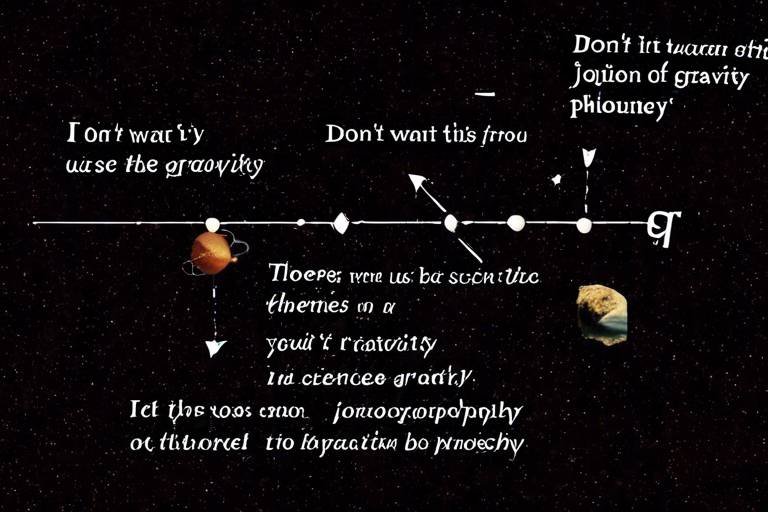Unifying Science and Philosophy - Will There be a Language of Nature?
Have you ever pondered the intricate dance between science and philosophy? It's like watching two brilliant minds engage in a passionate debate, each trying to outshine the other while simultaneously seeking common ground. Science, with its rigorous methodologies and empirical evidence, often seems worlds apart from philosophy, which delves into the abstract realms of thought, ethics, and existence. Yet, what if these two fields could speak the same language? What if there exists a universal dialect that not only bridges their gap but also enhances our understanding of the natural world? This article embarks on a journey to explore this tantalizing possibility.
At the heart of this exploration lies the question of whether a "language of nature" can be established—a means of communication that transcends the boundaries of scientific jargon and philosophical discourse. Imagine a world where scientists and philosophers collaborate seamlessly, sharing insights and discoveries that lead to profound advancements in our understanding of reality. This dream may not be as far-fetched as it seems. By examining the historical context of science and philosophy, we can uncover the threads that have woven these two disciplines together over the centuries.
Throughout history, luminaries from both fields have engaged in a dialogue that has shaped our modern understanding of the universe. From the ancient Greeks to contemporary thinkers, the interplay between scientific inquiry and philosophical reflection has sparked revolutions in thought. As we delve deeper into this relationship, we will uncover the philosophical foundations that underpin scientific inquiry, and how these principles can guide us toward a more unified understanding of nature.
In essence, the quest for a language of nature is not merely an academic endeavor; it is a profound exploration of what it means to know, to exist, and to understand the universe around us. As we navigate this landscape, we will consider the contributions of key philosophers and how their ideas have influenced scientific methodologies. We will also examine the role of mathematics as a universal language, the challenges of scientific communication, and the ethical implications of scientific discoveries. So, fasten your seatbelt as we embark on this intellectual adventure—who knows what revelations await us!

The Historical Context
To truly appreciate the intricate dance between science and philosophy, we must first delve into their historical context. These two fields, often seen as distinct, have a long-standing relationship that has evolved over centuries. From the ancient Greeks to the Enlightenment and beyond, the interplay between scientific discovery and philosophical inquiry has significantly shaped human thought and understanding.
In ancient times, thinkers like Plato and Aristotle laid the groundwork for both disciplines. Plato's theory of forms suggested that beyond our tangible reality lies a world of perfect ideals, which influenced how we perceive scientific phenomena. Aristotle, on the other hand, championed empiricism, advocating for knowledge gained through observation and experience. This foundational perspective remains crucial in scientific methodologies today.
As we transitioned into the Middle Ages, the fusion of science and philosophy continued, albeit under the shadow of religious doctrine. Scholars like Thomas Aquinas attempted to reconcile faith with reason, arguing that both could coexist harmoniously. This era saw the emergence of natural philosophy, where the study of the natural world was intertwined with metaphysical questions about existence and the divine.
The Renaissance marked a significant turning point, igniting a spirit of inquiry and skepticism. Figures such as Galileo Galilei and Francis Bacon championed the scientific method, emphasizing observation and experimentation over established authority. Their revolutionary ideas laid the groundwork for modern science, demonstrating that empirical evidence could challenge long-held beliefs.
As we moved into the Enlightenment, the relationship between science and philosophy became even more pronounced. Philosophers like Immanuel Kant explored the limits of human understanding and reason, questioning how we can know what we know. This period also saw the rise of positivism, where philosophers like Auguste Comte argued for a scientific approach to societal issues, further bridging the gap between the two fields.
In the 20th century, the emergence of new scientific theories, such as quantum mechanics and relativity, prompted philosophers to reevaluate the nature of reality and our understanding of the universe. The dialogue between scientists and philosophers became essential, as both sought to address profound questions about existence, knowledge, and the limits of human understanding.
Today, we find ourselves at a crossroads where science and philosophy can no longer afford to be seen as separate entities. The challenges of the modern world demand a collaborative approach, where philosophical inquiry informs scientific research and vice versa. This historical context not only enriches our understanding of both fields but also highlights the necessity of a unified approach to explore the mysteries of nature.
As we reflect on this rich tapestry of thought, it's clear that the historical relationship between science and philosophy is not merely a footnote in our quest for knowledge; it is a fundamental aspect of our intellectual heritage that continues to influence our understanding of the universe today.

Philosophical Foundations
When we delve into the realm of philosophy, we uncover a treasure trove of foundational principles that not only shape our understanding of the world but also guide the rigorous pursuits of science. At the heart of this exploration lies the intricate relationship between concepts such as truth, reality, and existence. These fundamental ideas are not merely abstract musings; they form the bedrock upon which scientific inquiry stands. Without these philosophical underpinnings, the very essence of scientific investigation would be akin to a ship sailing without a compass, lost in an ocean of uncertainty.
Imagine for a moment the significance of truth in scientific exploration. Scientists strive to uncover truths about the natural world, yet what does it mean to say something is "true"? This question has been pondered by philosophers for centuries. They have laid out various theories of truth, from the correspondence theory, which posits that truth corresponds to reality, to coherence theory, which suggests that truth is a matter of consistency within a set of beliefs. Each perspective offers a unique lens through which we can view scientific claims.
Moreover, the concept of reality itself is a philosophical puzzle. Is reality an objective entity that exists independently of our perceptions, or is it shaped by our experiences and cultural contexts? This debate has profound implications for science. If reality is subjective, then the scientific models we create may only represent a fraction of the truth. On the other hand, if reality is objective, then our scientific endeavors are aimed at uncovering universal laws that govern the cosmos.
Philosophy also compels us to reflect on the nature of existence. What does it mean to exist? This question has led to various ontological theories that categorize different types of existence, from physical objects to abstract concepts. In science, understanding the nature of existence can influence how we approach phenomena ranging from subatomic particles to the vastness of the universe. For instance, the philosophical inquiry into the existence of dark matter and dark energy drives scientists to explore realms of physics that challenge our traditional notions of matter and energy.
Philosophy doesn’t just inform scientific inquiry; it also challenges scientists to consider the implications of their discoveries. The intersection of science and philosophy is not merely academic; it has real-world consequences. For example, advancements in genetic engineering raise profound ethical questions about what it means to alter the fabric of life. Philosophical discussions around ethics, responsibility, and the potential consequences of scientific advancements are critical for guiding the future of research.
In summary, the philosophical foundations of science serve as a framework that enriches our understanding of nature. By engaging with these fundamental concepts, we foster a more profound appreciation for the complexities of the universe. The dialogue between science and philosophy is not just a theoretical exercise; it is essential for navigating the challenges of the modern world. As we continue to explore this relationship, we may discover new insights that propel both fields forward, enhancing our comprehension of the intricate tapestry of existence.
- What is the relationship between science and philosophy?
Science and philosophy are interconnected fields that inform and challenge each other, with philosophy providing foundational principles that guide scientific inquiry. - How does philosophy influence scientific ethics?
Philosophy plays a crucial role in shaping ethical considerations in science, prompting reflection on the implications of scientific advancements for society and the environment. - Can mathematics be considered a universal language?
Yes, mathematics is often regarded as the language of nature, providing a precise framework for expressing scientific concepts across various fields.

Key Philosophers
When we delve into the rich tapestry of thought that connects science and philosophy, we can't overlook the monumental contributions of key philosophers who have paved the way for modern scientific inquiry. These thinkers have not only shaped our understanding of the natural world but also influenced the methodologies that scientists use today. Their ideas resonate through the ages, reminding us that the quest for knowledge is as much a philosophical endeavor as it is a scientific one.
Let’s take a moment to spotlight a few of these pivotal figures:
- René Descartes: Often heralded as the father of modern philosophy, Descartes introduced the concept of skepticism and emphasized the importance of doubt in the search for certainty. His famous declaration, "Cogito, ergo sum" (I think, therefore I am), underscores the significance of consciousness and existence, laying the groundwork for future scientific exploration.
- Immanuel Kant: Kant's work bridged the gap between rationalism and empiricism, introducing the idea that our understanding of the universe is shaped by both experience and inherent structures of the mind. His critical philosophy encourages scientists to reflect on the limitations of human perception and cognition.
- David Hume: A skeptic at heart, Hume challenged the notion of causality, arguing that our understanding of cause and effect is rooted in habit rather than logical certainty. This perspective has profound implications for scientific methodology, particularly in the realms of experimentation and observation.
- Thomas Kuhn: Known for his concept of "paradigm shifts," Kuhn revolutionized how we view scientific progress. He argued that science does not evolve linearly but rather undergoes radical changes in understanding, which can be influenced by philosophical perspectives.
These philosophers, among others, have left an indelible mark on the landscape of science. Their inquiries into the nature of reality, knowledge, and existence provide a philosophical foundation that informs scientific practices. For instance, Descartes' emphasis on doubt encourages scientists to question their assumptions, while Kant's insights into perception remind us that our understanding is always mediated by our cognitive frameworks.
Moreover, the dialogue between these philosophical ideas and scientific methodologies fosters a richer comprehension of the universe. It invites scientists to not only seek empirical evidence but also to ponder the deeper implications of their findings. This interplay is crucial, especially in an era where scientific advancements raise profound ethical questions and challenges that require thoughtful consideration.
In conclusion, the contributions of key philosophers are essential for a holistic understanding of science. They remind us that the pursuit of knowledge is not just about data and experiments, but also about asking the right questions and reflecting on the implications of our discoveries. As we continue to explore the uncharted territories of nature, the wisdom of these thinkers will undoubtedly guide us in our quest for a unified understanding of the universe.
- What is the relationship between science and philosophy? Science and philosophy are intertwined fields; philosophy provides the foundational principles that guide scientific inquiry, while scientific discoveries often prompt new philosophical questions.
- How do key philosophers influence modern science? Key philosophers challenge scientists to reflect on their methodologies, assumptions, and the ethical implications of their work, fostering a more comprehensive approach to understanding nature.
- Can philosophy help solve scientific problems? Yes, philosophical inquiry can lead to new perspectives and insights that enhance scientific research, particularly in addressing complex ethical dilemmas and interdisciplinary challenges.

Plato and the Forms
Plato, one of the most influential philosophers in Western thought, introduced the concept of Forms—abstract, perfect entities that exist beyond our tangible reality. According to Plato, these Forms represent the true essence of various objects and concepts we encounter in the physical world. For instance, when we see a tree, it is merely a shadow of the ideal "Tree" Form, which embodies all the perfect qualities of treeness. This philosophical framework prompts us to ponder: how do these ideal Forms relate to the scientific phenomena we observe? Can science, with its empirical focus, truly grasp the essence of these abstract ideals?
Plato's theory of Forms invites us to consider the implications of abstraction in our quest for knowledge. It suggests that the physical world is just a reflection of a deeper reality, one that is not always accessible through empirical observation alone. This raises intriguing questions about the limitations of scientific inquiry. Can we fully understand nature if we only rely on what we can see, measure, and quantify? Or is there a richer, more profound reality that lies beyond our immediate perceptions, waiting to be explored?
To illustrate Plato's ideas further, let’s take a look at some key characteristics of the Forms:
| Characteristic | Description |
|---|---|
| Abstractness | Forms exist independently of the material world. |
| Perfection | Forms represent the ideal version of concepts. |
| Universality | Forms are the same across different instances in the physical world. |
| Immutability | Forms do not change; they are eternal and unchanging. |
Plato's exploration of Forms also raises the question of how these ideals can inform scientific practices. For example, when scientists formulate theories, they often seek to identify underlying principles that govern the observable universe. In this sense, they might be engaging with a modern interpretation of Plato's Forms, striving to uncover the fundamental truths that shape reality. This philosophical lens allows scientists to approach their work with a deeper understanding of the concepts they are investigating, potentially leading to more profound insights.
In conclusion, while Plato's theory of Forms may seem distant from the empirical rigor of modern science, it offers a compelling framework for understanding the relationship between abstract thought and scientific inquiry. By considering the existence of these ideal Forms, we can enhance our appreciation for the complexities of nature and the philosophical underpinnings that guide our quest for knowledge.

Aristotle's Empiricism
Aristotle's empiricism marks a significant turning point in the history of thought, as it laid the groundwork for the scientific method we recognize today. Unlike his mentor, Plato, who emphasized abstract forms and ideals, Aristotle championed the importance of observation and experience as the primary sources of knowledge. He believed that understanding the world requires us to engage directly with it, using our senses to gather data and draw conclusions. This approach not only shaped his philosophical inquiries but also influenced the development of various scientific disciplines.
At the heart of Aristotle's empiricism is the idea that knowledge is derived from the real world. He posited that we should study nature through careful observation and systematic classification of phenomena. Aristotle's work laid the foundation for biology, physics, and other sciences, as he meticulously documented his observations of plants, animals, and celestial bodies. His emphasis on empirical data collection can be seen in his famous works, such as "Nicomachean Ethics" and "Physics," where he systematically examined the natural world.
Moreover, Aristotle introduced the concept of induction, a method of reasoning that moves from specific observations to broader generalizations. This process is crucial in scientific inquiry, as it allows researchers to formulate hypotheses based on empirical evidence. For instance, if a scientist observes that a particular type of plant thrives in a specific environment, they can induce that similar plants may also flourish under those conditions. This method not only promotes a deeper understanding of nature but also encourages a flexible mindset, allowing for the evolution of theories as new data emerges.
Aristotle's influence extends beyond the realm of science into the very fabric of philosophy itself. His insistence on grounding knowledge in the observable world laid the groundwork for later thinkers who sought to reconcile empirical observation with metaphysical inquiry. This dual approach has led to profound discussions about the nature of reality, truth, and existence. Aristotle's legacy is evident in the way modern science operates, as the principles of observation, experimentation, and rational thought remain central to scientific practice today.
In summary, Aristotle's empiricism is not merely a historical footnote; it is a vital component of our understanding of the natural world. His emphasis on observation and experience has shaped the methodologies of countless scientific disciplines, and his ideas continue to resonate in contemporary discussions about the relationship between science and philosophy. By advocating for a systematic approach to knowledge, Aristotle has paved the way for future generations to explore the mysteries of the universe with both curiosity and rigor.

Modern Philosophical Perspectives
In today's fast-paced world, where scientific breakthroughs occur at lightning speed, the relationship between science and philosophy has never been more crucial. Modern philosophers are diving deep into the implications of these discoveries, questioning not just the how but also the why behind our understanding of the universe. They explore the philosophical underpinnings of scientific theories and the ethical ramifications that arise as we push the boundaries of knowledge. This intersection is like a vibrant tapestry, woven from threads of inquiry that connect the tangible with the abstract.
One of the key areas of focus for contemporary philosophers is the impact of scientific advancements on our perception of existence. For instance, the advent of quantum mechanics has led to debates about the nature of reality itself. Are we merely observers in a universe governed by chance, or is there an underlying order that we have yet to comprehend? Philosophers are not just passive spectators; they actively engage with scientists to dissect these profound questions, often leading to a richer understanding of both fields.
Moreover, the rise of interdisciplinary studies has fostered a collaborative spirit between scientists and philosophers. By integrating philosophical perspectives into scientific research, we can achieve a more holistic view of complex issues. For example, when tackling climate change, scientists can benefit from philosophical insights into ethics and responsibility, guiding them to consider the long-term implications of their work on both humanity and the planet. This collaborative approach can lead to innovative solutions that might not emerge from either discipline in isolation.
Another critical aspect of modern philosophical thought is the examination of scientific methodologies. Philosophers scrutinize the assumptions and frameworks that underpin scientific practices, asking questions such as: What constitutes valid evidence? How do biases influence our interpretation of data? These inquiries are vital as they help ensure that scientific practices remain robust and that the conclusions drawn are reliable. The dialogue between science and philosophy thus becomes a dynamic exchange, where each discipline informs and enriches the other.
As we look to the future, the relationship between science and philosophy is poised for further evolution. With the advent of emerging technologies like artificial intelligence and genetic engineering, philosophers are tasked with addressing the ethical dilemmas and societal implications that accompany these innovations. The questions they pose are not merely academic; they resonate deeply in our everyday lives. Will we maintain our humanity in the face of such rapid change? How do we ensure that scientific progress aligns with our ethical values?
In summary, modern philosophical perspectives are essential for navigating the complex landscape of contemporary science. By fostering dialogue between these two fields, we can cultivate a deeper understanding of the universe and our place within it, ensuring that our quest for knowledge is both profound and responsible.
- What is the relationship between science and philosophy? Science and philosophy intersect in their quest for understanding reality, with philosophy providing the foundational questions that guide scientific inquiry.
- How do modern philosophers influence scientific research? They offer ethical insights and challenge scientific assumptions, promoting a more holistic approach to complex problems.
- What role does ethics play in scientific advancements? Ethics is crucial in addressing the implications of new technologies and ensuring that scientific progress benefits society as a whole.
- Can philosophy and science work together effectively? Yes, interdisciplinary collaboration can lead to innovative solutions and a richer understanding of both fields.

The Language of Science
The language of science is often viewed through the lens of mathematics and technical jargon, which can sometimes feel like a foreign dialect to those outside the field. This perspective raises an intriguing question: can this specialized language truly serve as a universal medium for understanding the complexities of nature? Just as a painter uses colors to convey emotions, scientists employ their unique language to express intricate concepts, yet the accessibility of this language remains a significant concern.
At its core, science aims to unravel the mysteries of the universe, but the language it uses can create barriers. For instance, consider how a physicist might describe quantum mechanics using mathematical equations that seem incomprehensible to the layperson. This complexity can alienate those who are not versed in scientific terminology, making it difficult for them to engage with groundbreaking discoveries. Yet, the beauty of science lies in its potential to be understood by all, provided we find ways to bridge these communication gaps.
One of the most compelling arguments for mathematics as a universal language is its ability to transcend cultural and linguistic boundaries. Take a look at this simple table illustrating the universal constants that are recognized across various scientific disciplines:
| Constant | Symbol | Value |
|---|---|---|
| Speed of Light | c | 299,792,458 m/s |
| Gravitational Constant | G | 6.67430 × 10^-11 m^3 kg^-1 s^-2 |
| Planck's Constant | h | 6.62607015 × 10^-34 Js |
This table exemplifies how mathematical constants can be communicated universally, regardless of the language spoken. However, while mathematics can articulate the mechanics of the universe, it does not always capture the nuances of scientific inquiry, such as the ethical implications of research or the philosophical questions that arise from scientific advancements.
Moreover, scientific communication often faces challenges due to the specialized vocabulary and concepts that can leave the general public feeling excluded. To foster a deeper connection between science and society, it is essential to simplify complex ideas without diluting their essence. This can be achieved through various means:
- Public Engagement: Scientists can participate in community outreach programs to explain their work in layman's terms.
- Interdisciplinary Collaboration: By working with philosophers and communicators, scientists can develop clearer narratives around their research.
- Educational Initiatives: Incorporating science communication into educational curricula can equip future generations with the tools to understand scientific discourse.
In conclusion, while the language of science may be intricate and technical, it holds the potential to unite us in our quest for knowledge. The challenge lies in making this language more inclusive, ensuring that everyone has the opportunity to engage with and appreciate the wonders of the natural world. As we continue to explore the universe, let us strive to create a dialogue that invites all voices to participate in the conversation.
Q: Why is mathematics considered the language of science?
A: Mathematics provides a precise framework for expressing scientific concepts and relationships, allowing for clear communication across various fields.
Q: How can we improve scientific communication?
A: Enhancing public engagement, fostering interdisciplinary collaboration, and incorporating science communication in education can help bridge the gap.
Q: What role does philosophy play in scientific language?
A: Philosophy helps to frame ethical considerations and deeper questions that arise from scientific discoveries, enriching our understanding of the implications of research.

Mathematics as a Universal Language
Mathematics is often hailed as the universal language of nature, a concept that transcends cultural and linguistic barriers. But what does this really mean? At its core, mathematics provides a framework for understanding the patterns and relationships inherent in the universe. From the spirals of galaxies to the intricate designs of snowflakes, mathematical principles govern the underlying structures of the natural world. Just as a musician uses notes to create a symphony, scientists use mathematical equations to express the laws of physics, chemistry, and biology.
One of the most compelling aspects of mathematics is its ability to describe phenomena that might otherwise seem chaotic or random. For instance, consider the Fibonacci sequence, which appears in various natural forms, such as the arrangement of leaves on a stem or the pattern of seeds in a sunflower. This sequence, rooted in mathematical theory, reveals the underlying order within what might initially appear as randomness. In this way, mathematics acts as a lens through which we can view and interpret the complexities of nature.
Moreover, mathematics is not merely a tool for scientists; it serves as a bridge connecting different fields of study. For example, the principles of geometry are crucial in both architecture and astronomy, illustrating how mathematical concepts can apply across diverse disciplines. This interconnectedness highlights the potential of mathematics to foster collaboration and innovation among scientists, philosophers, and artists alike.
However, while mathematics may be universal, its accessibility often raises concerns. Many people feel intimidated by mathematical concepts, which can create barriers to understanding scientific principles. To address this issue, educators and communicators must strive to present mathematical ideas in a more relatable and engaging manner. By doing so, we can inspire a greater appreciation for the role of mathematics in our understanding of the world around us.
In conclusion, mathematics stands as a powerful and universal language that not only enhances our comprehension of nature but also fosters interdisciplinary dialogue. As we continue to explore the mysteries of the universe, embracing mathematics as a shared language will be crucial in bridging gaps between different fields and cultures, ultimately enriching our collective knowledge.
- Why is mathematics considered a universal language?
Mathematics is seen as a universal language because it provides a consistent framework for expressing and understanding scientific concepts across different cultures and languages.
- How does mathematics relate to nature?
Mathematics describes the patterns and relationships found in nature, helping us understand phenomena such as growth patterns, physical laws, and even the structure of the universe.
- What are some examples of mathematics in nature?
Examples include the Fibonacci sequence in flower petals, fractals in snowflakes, and the golden ratio in shells and galaxies.
- How can we make mathematics more accessible?
By using relatable examples, engaging teaching methods, and visual aids, we can help demystify mathematics and encourage more people to appreciate its significance.

Challenges of Scientific Communication
When we think about the language of science, we often envision a realm filled with complex equations, dense jargon, and technical terminology that can leave even the most curious minds scratching their heads. While science aims to explain the intricacies of the universe, the way it communicates its findings can sometimes feel like an impenetrable fortress. This exclusivity can create significant barriers, not only between scientists and the public but also among scientists from different disciplines. So, what are the main challenges that hinder effective scientific communication?
One of the primary issues is the specialized vocabulary that scientists use. Each field of study has its own set of terms that can be foreign to those outside the discipline. For instance, a biologist might speak of mitochondrial DNA while a physicist may refer to quantum entanglement. This divergence can lead to misunderstandings and a lack of engagement from the general public who may feel alienated by the technical language.
Moreover, the format of scientific publications often contributes to the communication gap. Research articles are typically written for an audience of peers, filled with data, methodologies, and conclusions that require a high level of expertise to fully comprehend. This can be incredibly daunting for non-specialists. To illustrate, consider the following table that outlines the differences in communication styles:
| Aspect | Scientific Communication | Public Communication |
|---|---|---|
| Language | Technical jargon | Simple, accessible language |
| Structure | Formal, structured | Conversational, engaging |
| Audience | Specialized peers | General public |
| Purpose | Peer review, advancement of knowledge | Education, awareness, engagement |
Another significant challenge is the perception of science. Many people view science as a rigid, unchanging field, which can lead to skepticism and distrust. This perception is often fueled by sensationalized media coverage of scientific topics, where findings are oversimplified or misrepresented. For example, a groundbreaking study on climate change may be reduced to a catchy headline without the necessary context, leading to confusion and misinformation among the public.
Additionally, the rapid pace of scientific advancement can overwhelm both scientists and the public. With new discoveries emerging almost daily, it can be challenging to keep up with the latest findings. This information overload can result in apathy, where people become desensitized to scientific news and fail to appreciate its relevance to their lives.
To bridge this communication gap, scientists and communicators must work together to create more inclusive and relatable narratives. This involves not only simplifying language but also utilizing various mediums such as social media, podcasts, and community outreach to engage broader audiences. By doing so, we can foster a culture of curiosity and understanding, making science more accessible and relevant to everyone.
In summary, the challenges of scientific communication are multifaceted, stemming from specialized language, publication formats, public perception, and the sheer volume of information. Addressing these obstacles is crucial for enhancing public understanding and appreciation of science, ultimately paving the way for a more informed society.
- Why is scientific communication important? Effective scientific communication is essential for educating the public, fostering trust in science, and promoting informed decision-making.
- How can scientists improve their communication skills? Scientists can improve their communication skills by simplifying their language, using relatable analogies, and engaging with diverse audiences through various platforms.
- What role does media play in scientific communication? Media can significantly influence public perception of science, making it crucial for them to accurately represent scientific findings and context.

Philosophy's Role in Science
Philosophy plays a critical role in shaping scientific theories and ethical considerations, prompting reflection on the implications of scientific advancements for society and the environment. At its core, philosophy encourages scientists to ask the "why" behind their findings. For instance, while science can tell us how a particular technology works, philosophy pushes us to consider its consequences on humanity and the natural world. This interplay is essential because it fosters a more comprehensive understanding of the impact of scientific endeavors.
As we delve deeper into the relationship between philosophy and science, we uncover several key areas where philosophical inquiry significantly influences scientific practices:
- Theoretical Frameworks: Philosophy helps in establishing the theoretical frameworks that guide scientific research. By questioning the assumptions underlying scientific models, philosophers can illuminate potential biases or gaps in reasoning.
- Ethical Considerations: With the rapid pace of scientific advancement, ethical dilemmas arise frequently. Philosophers contribute by evaluating the moral implications of scientific discoveries and technologies, ensuring that humanity’s welfare is considered.
- Conceptual Clarity: Philosophical analysis aids in clarifying concepts that are often taken for granted in scientific discourse. For example, the meaning of "life," "intelligence," or "consciousness" can greatly influence scientific research in biology, artificial intelligence, and cognitive science.
Consider the example of genetic engineering. Scientists can manipulate genes to create crops that are resistant to pests or diseases, but philosophy prompts critical questions: Should we alter the genetic makeup of living organisms? What are the long-term effects on ecosystems? This ethical exploration is vital for guiding responsible scientific practices.
Moreover, interdisciplinary approaches that integrate philosophical perspectives into scientific research can lead to more holistic solutions. For instance, addressing climate change requires not just scientific understanding but also ethical considerations regarding resource distribution, technological access, and environmental justice. By fostering collaboration between scientists and philosophers, we can encourage deeper insights into complex problems facing society today.
In summary, the relationship between philosophy and science is not merely complementary; it is essential for navigating the complexities of modern life. As we continue to explore new scientific frontiers, philosophical inquiry will remain a guiding force, ensuring that our advancements align with our ethical values and societal needs.
- How does philosophy influence scientific research? Philosophy influences scientific research by providing ethical frameworks, clarifying concepts, and questioning underlying assumptions in scientific theories.
- Why are ethical considerations important in science? Ethical considerations are crucial in science to ensure that advancements do not harm individuals, society, or the environment and to promote responsible research practices.
- Can science and philosophy work together? Yes, science and philosophy can work together effectively, leading to more comprehensive understandings of complex issues and fostering interdisciplinary collaboration.

Ethical Implications of Scientific Discoveries
The rapid advancement of science has ushered in an era filled with groundbreaking discoveries that have the potential to transform our lives. However, with great power comes great responsibility. As we delve deeper into the realms of genetics, artificial intelligence, and biotechnology, we must pause to consider the ethical implications these scientific breakthroughs entail. Are we prepared to face the moral dilemmas that accompany these innovations? This question lingers in the minds of scientists, ethicists, and society at large.
One of the most pressing ethical concerns arises from genetic engineering. The ability to manipulate the genetic makeup of organisms, including humans, opens a Pandora's box of possibilities. For instance, while gene editing technologies like CRISPR promise to eradicate genetic diseases, they also raise questions about designer babies and the potential for socio-economic disparities. Can we ensure that such powerful technologies are used for the greater good, or will they exacerbate existing inequalities?
Moreover, the rise of artificial intelligence presents its own set of ethical challenges. As machines become increasingly capable of performing tasks traditionally reserved for humans, we must grapple with questions of autonomy and responsibility. Who is accountable when an AI system makes a mistake? The developers? The users? This ambiguity complicates our understanding of accountability in an age where machines learn and adapt.
In the realm of biotechnology, the creation of synthetic organisms raises profound ethical questions about the nature of life itself. Are we playing God by creating life forms in a laboratory? What are the long-term consequences of introducing synthetic organisms into the ecosystem? The potential for unintended consequences is significant, and the ethical responsibility to consider these outcomes cannot be overstated.
To navigate these ethical waters, interdisciplinary collaboration is essential. Scientists, philosophers, and ethicists must engage in ongoing dialogue to explore the implications of scientific discoveries. By fostering an environment where diverse perspectives are valued, we can better understand the complexities of these issues and work towards solutions that prioritize humanity's well-being.
In conclusion, the ethical implications of scientific discoveries are vast and multifaceted. As we continue to push the boundaries of knowledge, it is imperative that we examine the moral dimensions of our advancements. By doing so, we not only safeguard the future of science but also ensure that our discoveries benefit society as a whole.
- What are the main ethical concerns in scientific research? Ethical concerns often revolve around the implications of genetic engineering, artificial intelligence, and biotechnology, particularly regarding accountability and the potential for misuse.
- How can interdisciplinary collaboration help address ethical issues? By bringing together diverse perspectives from science, philosophy, and ethics, we can gain a more comprehensive understanding of the implications of scientific advancements.
- What role does public opinion play in scientific ethics? Public opinion can significantly influence the direction of scientific research and the ethical guidelines that govern it, highlighting the need for transparency and engagement with the community.

Interdisciplinary Approaches
In an era where the challenges we face are increasingly complex, the need for has never been more critical. When we think about the intersection of science and philosophy, it becomes clear that these fields can no longer operate in silos. They must converge to tackle the pressing issues of our time—issues like climate change, technological ethics, and health crises. By blending insights from various disciplines, we can create a more comprehensive understanding of the world around us.
Consider the relationship between scientific research and philosophical inquiry. Science provides empirical data and observable phenomena, while philosophy offers a framework for interpreting these findings. This synergy can lead to innovative solutions that are not only scientifically sound but also ethically responsible. For instance, when scientists develop new technologies, philosophers can help navigate the moral implications of these advancements, ensuring that they align with societal values.
One striking example of this interdisciplinary collaboration is found in the field of environmental science. Here, scientists study ecosystems and climate dynamics, while philosophers explore our ethical responsibilities towards nature. Together, they can formulate policies that not only address environmental degradation but also resonate with our moral obligations to future generations. This collaborative effort highlights the importance of integrating diverse perspectives to foster a deeper understanding of complex issues.
Moreover, interdisciplinary approaches can enhance educational frameworks. By encouraging students to engage with both scientific and philosophical concepts, we cultivate critical thinking skills that are essential for problem-solving in the modern world. Imagine a classroom where students analyze scientific data while simultaneously debating the ethical implications of genetic engineering. This holistic approach not only enriches their learning experience but also prepares them to become informed citizens capable of making thoughtful decisions.
To facilitate these interdisciplinary connections, institutions and organizations must prioritize collaboration. This could involve establishing joint research initiatives or creating forums for dialogue between scientists and philosophers. By fostering an environment where ideas can flow freely between disciplines, we can unlock new pathways for innovation and understanding.
In conclusion, the integration of science and philosophy through interdisciplinary approaches is crucial for addressing the multifaceted challenges we face today. By working together, these fields can provide a richer, more nuanced understanding of our world, ultimately leading to solutions that are not only effective but also ethically sound. As we move forward, let us embrace this collaborative spirit and recognize that the answers to our most pressing questions often lie at the intersection of different disciplines.
- What are interdisciplinary approaches? Interdisciplinary approaches involve combining insights and methodologies from different fields to tackle complex problems more effectively.
- Why are interdisciplinary approaches important? They allow for a more comprehensive understanding of issues, fostering innovation and ethical considerations that single-discipline approaches might overlook.
- How can education benefit from interdisciplinary approaches? By integrating various disciplines, students develop critical thinking skills and a broader perspective, preparing them for real-world challenges.
- Can you provide an example of interdisciplinary collaboration? One example is the partnership between environmental scientists and ethicists to address climate change, focusing on both data and moral responsibilities.

The Future of Science and Philosophy
As we gaze into the horizon of knowledge, the relationship between science and philosophy appears more intertwined than ever. With each scientific breakthrough, we are not just uncovering the mysteries of the universe; we are also posing profound questions about our existence, our ethics, and the very fabric of reality. The future promises a fascinating landscape where these two fields can converge in ways that enhance our understanding of both nature and ourselves.
Imagine a world where scientific discoveries are not isolated events but are woven into the philosophical fabric of our societies. This integration could lead to a new paradigm where scientific inquiry is guided by ethical considerations, ensuring that our advancements in technology and knowledge do not outpace our moral compass. For instance, as we develop artificial intelligence and genetic engineering, we must ask ourselves: what does it mean to be human? What ethical responsibilities do we hold?
Moreover, the advent of interdisciplinary research is set to revolutionize how we approach complex issues. By merging insights from both science and philosophy, we can tackle pressing global challenges such as climate change, public health crises, and social inequalities. This collaborative spirit could foster innovative solutions that are not only scientifically sound but also ethically grounded. Picture a team of scientists and philosophers working side by side, brainstorming ways to combat ecological degradation while ensuring that marginalized communities are heard and respected.
In this future landscape, the language of science might evolve as well. Currently, scientific communication can be laden with jargon that alienates the general public. However, as we strive for a universal language of nature, there is potential for a more accessible dialogue. This could involve simplifying complex concepts without losing their essence, making science not just a domain for experts but a shared pursuit for all. Imagine a world where the wonders of quantum physics are explained through relatable analogies, allowing everyone to grasp the beauty of the universe.
Furthermore, the role of technology in bridging gaps between science and philosophy cannot be overlooked. With the rise of digital platforms, we have unprecedented access to information and ideas. Online forums, webinars, and collaborative projects can facilitate discussions that were once confined to academic circles. This democratization of knowledge can empower individuals to engage with both scientific and philosophical ideas, fostering a culture of inquiry and critical thinking.
As we stand on the brink of this new era, it is crucial to remain open-minded and adaptable. The future will undoubtedly present us with challenges that require innovative thinking and ethical deliberation. By embracing the synergy between science and philosophy, we can cultivate a deeper understanding of our universe and our place within it, ultimately leading to a richer, more meaningful existence.
- How can philosophy influence scientific research?
Philosophy can shape the ethical frameworks and foundational principles that guide scientific inquiry, ensuring that research is conducted responsibly and with consideration of its societal implications. - What are some examples of interdisciplinary approaches in science and philosophy?
Examples include bioethics, environmental philosophy, and cognitive science, where insights from both fields are combined to address complex issues. - Why is it important to make scientific language more accessible?
Accessible scientific language fosters public engagement and understanding, allowing more people to participate in discussions about critical issues affecting society.
Frequently Asked Questions
- What is the relationship between science and philosophy?
Science and philosophy are deeply intertwined. Philosophy provides the foundational concepts that guide scientific inquiry, such as the nature of truth and existence. In turn, scientific discoveries can challenge and refine philosophical ideas, creating a dynamic dialogue between the two fields.
- Can mathematics be considered a universal language?
Absolutely! Mathematics is often viewed as the language of nature due to its precision and ability to describe complex relationships in the universe. It transcends cultural and linguistic barriers, making it a powerful tool for scientists across various disciplines.
- How does philosophy influence scientific ethics?
Philosophy plays a crucial role in shaping the ethical framework surrounding scientific advancements. As new technologies emerge, philosophical inquiry helps us navigate the moral implications, ensuring that scientific progress aligns with societal values and the well-being of the environment.
- What challenges exist in scientific communication?
Scientific language can often be technical and exclusionary, creating barriers to understanding for the general public. This lack of accessibility can hinder effective communication and collaboration across disciplines, which is vital for addressing complex global issues.
- How can integrating philosophy into science benefit society?
Integrating philosophical perspectives into scientific research can lead to more holistic approaches. It encourages interdisciplinary collaboration, fostering deeper insights into the challenges we face today, and promoting a more comprehensive understanding of our place in the universe.
- What does the future hold for the relationship between science and philosophy?
The relationship between science and philosophy is likely to evolve, especially as new discoveries challenge our current understanding. This evolution may lead to new frameworks that enhance our grasp of the universe and our role within it, ultimately enriching both fields.



















